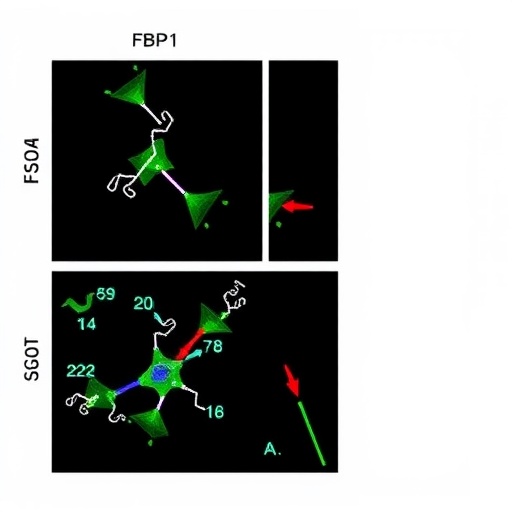In a groundbreaking study poised to redefine therapeutic strategies for clear cell renal cell carcinoma (ccRCC), researchers have unveiled the potent anti-cancer effects of MLN4924, a small-molecule inhibitor initially designed to target cellular protein degradation pathways. This study elucidates the intricate metabolic reprogramming of ccRCC tumors and demonstrates how MLN4924 interrupts these pathological processes by stabilizing nuclear fructose-1,6-bisphosphatase 1 (FBP1), a pivotal enzyme in gluconeogenesis and metabolic regulation. The findings open new avenues for exploiting tumor metabolism to curb cancer progression and highlight the therapeutic promise of targeting nuclear metabolic enzymes.
Clear cell renal cell carcinoma remains one of the most aggressive and treatment-resistant kidney cancers worldwide. Its hallmark lies not only in its distinct histopathological presentation but also in its well-orchestrated metabolic dysregulation, which fuels rapid tumor growth and survival under adverse microenvironmental conditions. The metabolic plasticity of ccRCC, especially its preference for aerobic glycolysis and altered gluconeogenesis, underscores the critical role of metabolic enzymes like FBP1. Until now, targeting these enzymes has been challenging due to the complexity of their regulatory networks and subcellular localizations.
The study conducted by Yang, Ma, Fan, and colleagues delves deeply into the mechanistic underpinnings of MLN4924’s anti-tumor efficacy. MLN4924, also known as pevonedistat, functions primarily as an inhibitor of the NEDD8-activating enzyme (NAE). By blocking the neddylation process, MLN4924 impairs the activity of cullin-RING E3 ubiquitin ligases (CRLs), pivotal mediators of ubiquitin-dependent protein degradation. This disruption stabilizes a variety of substrates previously targeted for proteasomal degradation, thereby modulating cellular pathways relevant to cancer progression.
Among the newly stabilized proteins identified, nuclear FBP1 emerged as a key mediator of tumor metabolism suppression upon MLN4924 treatment. FBP1, classically recognized for its cytoplasmic role in gluconeogenesis, exhibits a lesser-known nuclear localization with significant regulatory functions including transcriptional control and metabolic gene expression modulation. The researchers demonstrated that MLN4924 stabilizes FBP1 within the nucleus, attenuating glycolytic flux, and reinforcing metabolic checkpoints that hinder tumor proliferation.
Through comprehensive in vitro and in vivo analyses, the team verified that ccRCC cells treated with MLN4924 display a substantial decrease in aerobic glycolysis, manifesting as reduced glucose uptake and lactate production. These metabolic shifts culminate in inhibited tumor growth and increased apoptosis. Importantly, the stabilization of nuclear FBP1 by MLN4924 proved instrumental in mediating these metabolic alterations, establishing a direct causal link between FBP1 nuclear dynamics and cancer cell metabolic reprogramming.
The experimental framework leveraged advanced proteomic and metabolomic technologies to dissect the molecular echelon through which MLN4924 exerts its effects. Noteworthy was the observation that nuclear FBP1 acts as a metabolic checkpoint by repressing hypoxia-inducible factor 1-alpha (HIF-1α) target genes, which are heavily implicated in promoting the Warburg effect and sustaining proliferation in hypoxic tumor microenvironments. Consequently, nuclear FBP1 stabilization suppresses HIF-1α-driven transcriptional programs, undermining one of ccRCC’s central survival mechanisms.
Further mechanistic interrogation revealed that the inhibition of NAE by MLN4924 leads to reduced ubiquitination and proteasomal degradation of nuclear FBP1, prolonging its half-life and functionality in the nucleus. This novel insight into the post-translational regulation of FBP1 offers a fresh perspective on how metabolic enzyme localization and stability can be pharmacologically manipulated to achieve anti-cancer outcomes.
The translational implications of these findings are profound. MLN4924’s capacity to modulate cancer metabolism through stabilization of nuclear FBP1 suggests it could serve as a dual-function therapeutic: both disrupting protein turnover mechanisms and reprogramming tumor metabolism. Such multifaceted targeting is particularly valuable in resistant cancer phenotypes like ccRCC, where monotherapies often fall short due to adaptive cellular responses.
In preclinical models, systemic administration of MLN4924 significantly curtailed tumor burden without appreciable toxicity, bolstering the argument for clinical evaluation of MLN4924 in ccRCC patients. The therapeutic window outlined offers hope for integrating metabolism-centered interventions within standard oncology care, potentially in combination with existing targeted therapies or immunotherapies.
Beyond ccRCC, these insights may hold broader significance for other malignancies characterized by aberrant metabolic regulation and adaptive survival strategies. The nuclear functions of metabolic enzymes like FBP1, often overshadowed by their cytoplasmic roles, emerge as versatile intervention points for novel anti-cancer strategies.
However, several critical questions remain unanswered, inviting future research directions. How the nuclear localization signals of FBP1 are regulated, which E3 ligases are directly responsible for its ubiquitination, and whether MLN4924 influences other nuclear metabolic enzymes similarly awaits elucidation. Addressing these questions will refine our understanding of metabolic enzyme crosstalk within nuclear compartments and enhance therapeutic specificity.
Moreover, the potential resistance mechanisms to MLN4924 warrant thorough investigation. Cancer cells are notorious for their ability to bypass targeted interventions through compensatory pathways. Unraveling potential evasive responses could inform combinatorial approaches that sustain clinical efficacy and prevent relapse.
The study also emphasizes the importance of integrating multi-omics approaches to untangle cancer’s complexity. By combining proteomics, transcriptomics, and metabolomics, the researchers constructed a detailed map of MLN4924’s impact, highlighting the superiority of systems biology in guiding drug development and precision medicine.
In conclusion, the work by Yang et al. represents a landmark advancement in our comprehension of ccRCC metabolism and its pharmacological manipulation. The identification of MLN4924 as a stabilizer of nuclear FBP1 that effectively suppresses tumor metabolism and growth paves the way for metabolic enzyme-centered cancer therapies with distinct mechanisms and promising clinical potential. As metabolic reprogramming remains a cornerstone of oncogenic transformation, studies such as this reaffirm the power of targeting metabolic vulnerabilities to outmaneuver cancer’s adaptive arsenal.
Subject of Research: The study focuses on the therapeutic effects of MLN4924 on clear cell renal cell carcinoma, specifically its role in suppressing tumor metabolism and growth by stabilizing nuclear fructose-1,6-bisphosphatase 1 (FBP1).
Article Title: MLN4924 suppresses tumor metabolism and growth of clear cell renal cell carcinoma by stabilizing nuclear FBP1.
Article References:
Yang, Y., Ma, Y., Fan, S. et al. MLN4924 suppresses tumor metabolism and growth of clear cell renal cell carcinoma by stabilizing nuclear FBP1. Cell Death Discov. 11, 253 (2025). https://doi.org/10.1038/s41420-025-02426-8
Image Credits: AI Generated




